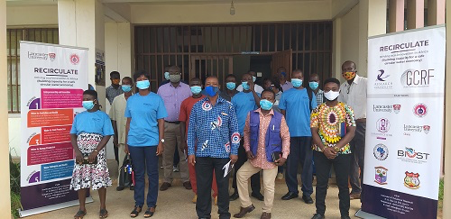The Institute of Industrial Research (IIR) of the Council for Scientific and Industrial Research (CSIR) has held an open-day as part of its stakeholder engagements planned for Work Package 3 of the Recirculate project, which is currently underway.
The event was held under the topic ‘Water for Food Production’, and used as an advocacy tool and engagement strategy to raise awareness for the Recirculate project and its activities in the development, transfer, and utilisation of the research findings; and also to exchange knowledge with farmers to explore the commercial potential of irrigation scheduling, which sought to address shortfalls in water availability for crop production within the context of national development.
The selected topic’s core objective is to identify what approaches to water-efficient irrigation are most appropriate for the cultivation of fresh produce, given the water resources available.
It also seeks to investigate how efficient techniques can be developed and optimised for farmer communities, which will require an understanding of the socio-economic barriers to adoption of water-saving irrigation techniques in selected communities.
The event was in two parts: the first session consisted of the opening, with the second part being a field trip to the project site where experimental field trials on the various irrigation scheduling techniques are conducted to compare the growth, yield and water productivity response of tomato plants subjected to thermal imaging (plant sensing) Penman-Monteith (meteorology), tensiometer (soil sensing) and grower intuition methods of irrigation scheduling.
Joseph Yaw Amoah, Deputy Director-CSIR-IIR who chaired the event, welcomed farmers from the three selected communities in the Central Region of Ghana – namely Gomoa Okyereko, Baifikrom and Mankesim – as well as other key stakeholders in the Agri Food Chain to the Institute and to the event. Mr. Amoah re-emphasised CSIR’s commitment to solving problems through research to facilitate national development.
Mr. Amoah gave a brief overview of the Open-Day and underscored why it is important for the Institute to open its doors to the general public. He further explained that it is important for stakeholders to know more about CSIR, so they tap into its expertise. “This Open-Day therefore serves as a frontier for you to learn at first-hand through interaction,” he noted.
He acknowledged organisations which collaborated with the Institute, and even those that helped the Institute get data to enrich its field research. He also said that the occasion was an opportunity for self-examination in order to put the Institute on its toes and drive to a better, new direction.
Dr. William Owusu Oduro, CSIR-IIR – who is the coordinator for the Work Package 3 of the Recirculate project, shed more light on the project with special emphasis of the various Work Packages and their relevance to human sustenance and development. He remarked that the project seeks to help minimise waste and to maximise the benefits derived from natural resources and the environment as a whole.
The second session lasted for almost two hours, and was mainly devoted to the technical activities, knowledge-sharing and interactions whereby scientific research findings met local knowledge and experience. The session was led by Mr. Gilbert Osei, who is a versatile researcher with interest in deficit irrigation, drip irrigation, pitcher irrigation and irrigation water quality.










